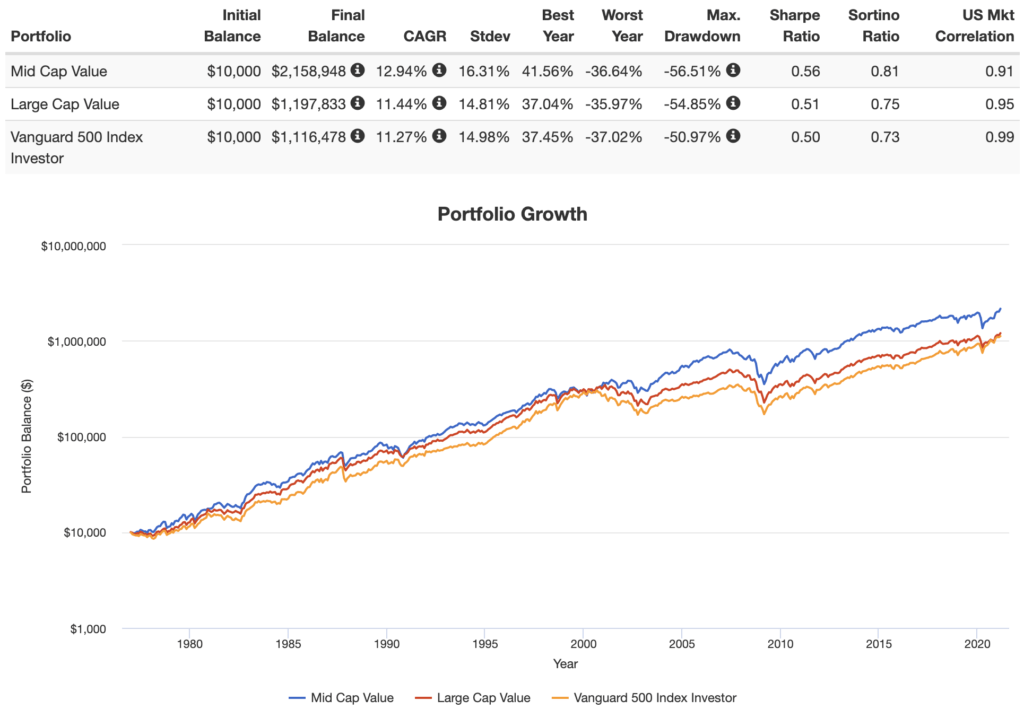Mid-cap value stocks allow you to capture the value premium within mid-caps. Below we'll review the 5 best mid cap value ETFs for 2024.
Disclosure: Some of the links on this page are referral links. At no additional cost to you, if you choose to make a purchase or sign up for a service after clicking through those links, I may receive a small commission. This allows me to continue producing high-quality content on this site and pays for the occasional cup of coffee. I have first-hand experience with every product or service I recommend, and I recommend them because I genuinely believe they are useful, not because of the commission I may get. Read more here.
In a hurry? Here's the list:
- IWS – iShares Russell Midcap Value ETF
- VOE – Vanguard Mid-Cap Value ETF
- IJJ – iShares S&P MidCap 400 Value ETF
- MDYV – SPDR S&P 400 Mid Cap Value ETF
- IVOV – Vanguard S&P Mid-Cap 400 Value ETF
Contents
Introduction – Why Mid Cap Value?
The Value premium comes from Value being an independent risk factor, which should be more prominent in mid caps than in large caps. Mid caps have also outperformed large caps historically due to the Size premium (small stocks tend to outperform large stocks). Here is mid cap value vs. large cap value and the S&P 500 going back to 1977:

Let's explore the best mid cap value ETFs.
The 5 Best Mid Cap Value ETFs
Below are the 5 best mid cap value ETFs to capture the Value factor premium within mid caps.
IWS – iShares Russell Midcap Value ETF
The iShares Russell Midcap Value ETF (IJS) is the most popular mid cap value ETF with over $12.5 billion in assets. As the name suggests, the fund seeks to track the Russell Midcap Value Index. Unfortunately, it is the most expensive ETF on the list with an expense ratio of 0.24%, and its factor exposure does not make up for this higher cost. Day traders, however, will appreciate the liquidity.
VOE – Vanguard Mid-Cap Value ETF
The Vanguard Mid-Cap Value ETF (VOE) rivals IWS above in terms of popularity, with a little over $12 billion in assets. The fund seeks to track the CRSP US Mid Cap Value Index and has an expense ratio of only 0.07%, making it the most affordable on this list. Unfortunately, VOE also has the poorest factor loading on this list. That is, it doesn't really provide consistent, reliable exposure to the Value factor.
IJJ – iShares S&P MidCap 400 Value ETF
The iShares S&P MidCap 400 Value ETF (IJJ) is the first of three ETFs that seeks to track the S&P MidCap 400 Value Index. In terms of Value factor exposure, this index is objectively superior to the previous two.
With its earnings screen, we also conveniently get some exposure to the Profitability factor. In other words, we're able to capture mid cap stocks that are considered cheap and have strong financials.
Of the 3 funds that track this index, though, IJJ happens to be the most expensive with a fee of 0.18%.
MDYV – SPDR S&P 400 Mid Cap Value ETF
MDYV also tracks the S&P 400 Mid Cap Value Index but at a slightly lower cost of 0.15% and is likely a better long-term holding than IJJ for that reason. Day traders may still prefer IJJ due to its comparatively greater liquidity.
MDYV would be my choice for a mid cap value ETF.
IVOV – Vanguard S&P Mid-Cap 400 Value ETF
IVOV is the final ETF that tracks the S&P 400 Mid Cap Value Index. It does a fine job at doing so, but its fee is the same as MDYV above at 0.15% and its volume and AUM are lower, so there's no real reason to prefer IVOV unless you just want to stay within the Vanguard fund universe.
Where to Buy These Mid Cap Value ETFs
All these mid cap value ETFs should be available at any major broker. My choice is M1 Finance. M1 has zero trade commissions and zero account fees, and offers fractional shares, dynamic rebalancing, and a sleek, user-friendly interface and mobile app. I wrote a comprehensive review of M1 Finance here.
Interested in more Lazy Portfolios? See the full list here.
Disclaimer: While I love diving into investing-related data and playing around with backtests, this is not financial advice, investing advice, or tax advice. The information on this website is for informational, educational, and entertainment purposes only. Investment products discussed (ETFs, mutual funds, etc.) are for illustrative purposes only. It is not a research report. It is not a recommendation to buy, sell, or otherwise transact in any of the products mentioned. I always attempt to ensure the accuracy of information presented but that accuracy cannot be guaranteed. Do your own due diligence. I mention M1 Finance a lot around here. M1 does not provide investment advice, and this is not an offer or solicitation of an offer, or advice to buy or sell any security, and you are encouraged to consult your personal investment, legal, and tax advisors. Hypothetical examples used, such as historical backtests, do not reflect any specific investments, are for illustrative purposes only, and should not be considered an offer to buy or sell any products. All investing involves risk, including the risk of losing the money you invest. Past performance does not guarantee future results. Opinions are my own and do not represent those of other parties mentioned. Read my lengthier disclaimer here.

Are you nearing or in retirement? Use my link here to get a free holistic financial plan and to take advantage of 25% exclusive savings on financial planning and wealth management services from fiduciary advisors at Retirable to manage your savings, spend smarter, and navigate key decisions.


Leave a Reply